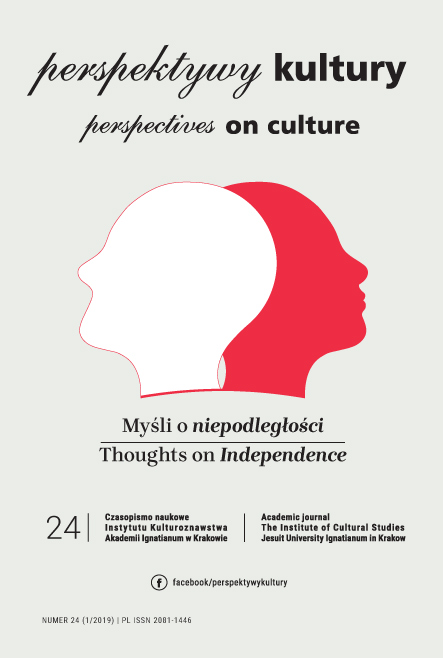Cypriana Norwida myśli o niepodległości
Abstrakt
Prezentowany szkic Cypriana Norwida myśli o niepodległości uwzględnia tylko wypowiedzi Cypriana Norwida po 1864 r., po upadku powstania styczniowego. Jako punkt wyjścia rozważań przyjęto najważniejszy dla poruszanej problematyki tekst z 1869 r. rozprawki epistolarnej Walka-polska, skierowanej do Agatona Gillera. Podstawowa teza rozprawki, iż Polacy „umieją bić się”, ale „nie umieją walczyć”, jest jednym z głównych założeń krytycznego poglądu Norwida na temat polskich dróg do niepodległości. Poza rozprawką Walka-polska, powyższy szkic przypomina jeszcze inne teksty Norwida, ważne dla problematyki niepodległości. Chodzi o [Odezwę w sprawie udziału Polaków w wojnie francusko-pruskiej] z 1870 r. oraz Odpowiedź Cypriana Kamila N. niektórym obywatelom o stanie rzeczy narodowej zapytującym z okresu wojny rosyjsko-tureckiej z 1877 r. Wymienione dyskursywne teksty dopełnia wiersz Norwida Co robić?, w którym pada zasadnicze dla problematyki niepodległości pytanie: „Co począć w rozebranym kraju?”. Zamieszczone w szkicu rozważania zamykają uwagi Norwida na temat znaczenia duchowej niepodległości, której waga niekiedy mogła być istotniejsza niż niepodległość rozumiana tylko politycznie.
Bibliografia
Giller, A. (1867-1871). Historia powstania narodu polskiego w 1861-1864 r., vol. 1-4. Paryż.
Konieczny, J. (1970). Cybernetyka walki. Warszawa.
Kotarbiński, T. (1965). Traktat o dobrej robocie, 3rd ed. Wrocław.
Lewak, A. (1935). Dzieje emigracji polskiej w Turcji (1831-1878). Warszawa.
Norwid, C. (1966). Dzieła zebrane, ed. J.W. Gomulicki, vol. 1-2: Wiersze. Warszawa.
Norwid, C. (1971-1976). Pisma wszystkie, collected, edited and provided with a foreword by J.W. Gomulicki, vol. 1-11. Warszawa.
Pobóg-Malinowski, W. (1984). Najnowsza historia polityczna Polski, vol. 1: 1864-1914. London.
Rudniański, J. (1983). Elementy prakseologicznej teorii walki. Warszawa.
Zahorski, A. (1974). Spór o Napoleona we Francji i w Polsce. Warszawa.
Zdanowicz, A. et al. (ed.). (1861). Słownik języka polskiego, p. I-II. Wilno.
Złotorzycka, M. (1935). Próba utworzenia oddziału polskiego w czasie ob¬lężenia Paryża przez Prusaków (1870-1871). Niepodległość, XI, issue 3, 325-350.
Żuk, A. (1996). Filozofia walki. Lublin.
Copyright (c) 2019 Perspektywy Kultury

Utwór dostępny jest na licencji Creative Commons Uznanie autorstwa – Bez utworów zależnych 4.0 Międzynarodowe.
Autor, zgłaszając swój artykuł, wyraża zgodę na korzystanie przez Wydawnictwo Uniwersystet Ignatianum z utworu na następujących polach eksploatacji:
- utrwalania utworu w formie papierowej, a także na nośniku cyfrowym lub magnetycznym;
- zwielokrotnienia utworu dowolną techniką, bez ograniczenia ilości wydań i liczby egzemplarzy;
- rozpowszechniania utworu i jego zwielokrotnionych egzemplarzy na jakimkolwiek nośniku, w tym wprowadzenia do obrotu, sprzedaży, użyczenia, najmu;
- wprowadzenia utworu do pamięci komputera;
- rozpowszechniania utworu w sieciach informatycznych, w tym w sieci Internet;
- publicznego wykonania, wystawienia, wyświetlenia, odtworzenia oraz nadawania i reemitowania, a także publicznego udostępniania utworu w taki sposób, aby każdy mógł mieć do niego dostęp w miejscu i czasie przez siebie wybranym.
Wydawca zobowiązuje się szanować osobiste prawa autorskie do utworu.





